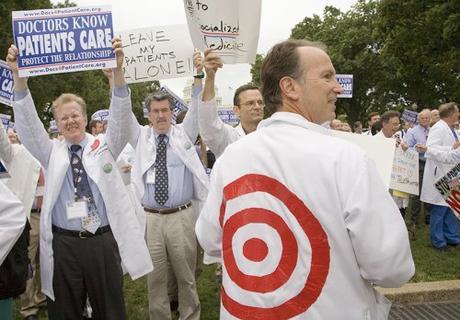What will you do when you’re sick, but you can’t find a doctor?
Frustrated with how they are being paid for their professional service, more and more physicians and other healthcare professionals in Vermont — socialist Bernie Sanders’ very liberal home state — are opting out of the state’s increasingly socialized healthcare system.

Emma Lamberton reports for Watchdog, April 12, 2016, that struggling Vermont health professionals are going private or leaving the state, in order to provide quality care for patients.
Even going private is not a solution. Third-party payers like Blue Cross Blue Shield, Medicare, and Medicaid negotiate their payment rates with individual providers. But as public systems continue to grow larger, hospital monopolies can negotiate better pay rates than private practices, resulting in a pay equity difference of as much as 240%.
In Vermont, Medicaid pays doctors only 60% of the cost of providing services, while Medicare pays 80%. This means private practice doctors who serve large numbers of those patients stand to lose money because they have few options for making up the difference. That would explain why Vermont has fewer independent doctors (20%) than the rest of the country (50%).
Dr. Mark Healey, a surgeon in a private practice in Colchester, is relocating to New York. He says: “I am at a tipping point. Because of the difference in remuneration by insurance companies, I can no longer compete and still give the care I would like.”
Although Healey once worked in the public system when he first came to Vermont in 1999 and was hired as director of the Surgical Intensive Care Unit at the University of Vermont Medical Center (UVM), he says he will not go back to UVM because “I would not be able to provide the style of care that I would like. (Studies show) that when you compare public practice to private, responsiveness and appointment availability go down, while wait times and cost go up.”
Healey is not the only medical professional disenchanted with the state’s health care system. Nurse practitioner William Goodwin of Danby says he left Community Health Centers of the Rutland Region to start his own practice because “My dream is the idyllic notion of the old country doctor. The public system is cold, clinical and impersonal. It makes patients nervous because they feel they have no power. It robs them of personhood.”
Operating from his home, Goodwin makes visits using the old house call model, driving to patients for appointments. He brings his clinic supplies with him for visits and, like public practices, outsources lab work.
Goodwin believes personalized medicine is the key to cutting costs: “By getting to know my patient, I save them money. If I get a call from a patient saying they feel dizzy, I can recognize that symptom and connect it to what I know about them — that they are prone to anxiety and panic attacks. If they call a doctor who doesn’t know them, they will unnecessarily send them to the ER for an EKG, costing thousands of dollars.”
Both Healey and Goodwin agree that one of the most important policies for Vermont’s health care future is to create an environment where private practices are allowed to thrive. But Healey warns that “The cards are stacked so hard against us. The community is losing out. Competition is good. When a monopoly develops, responsiveness decreases.”
~Eowyn

